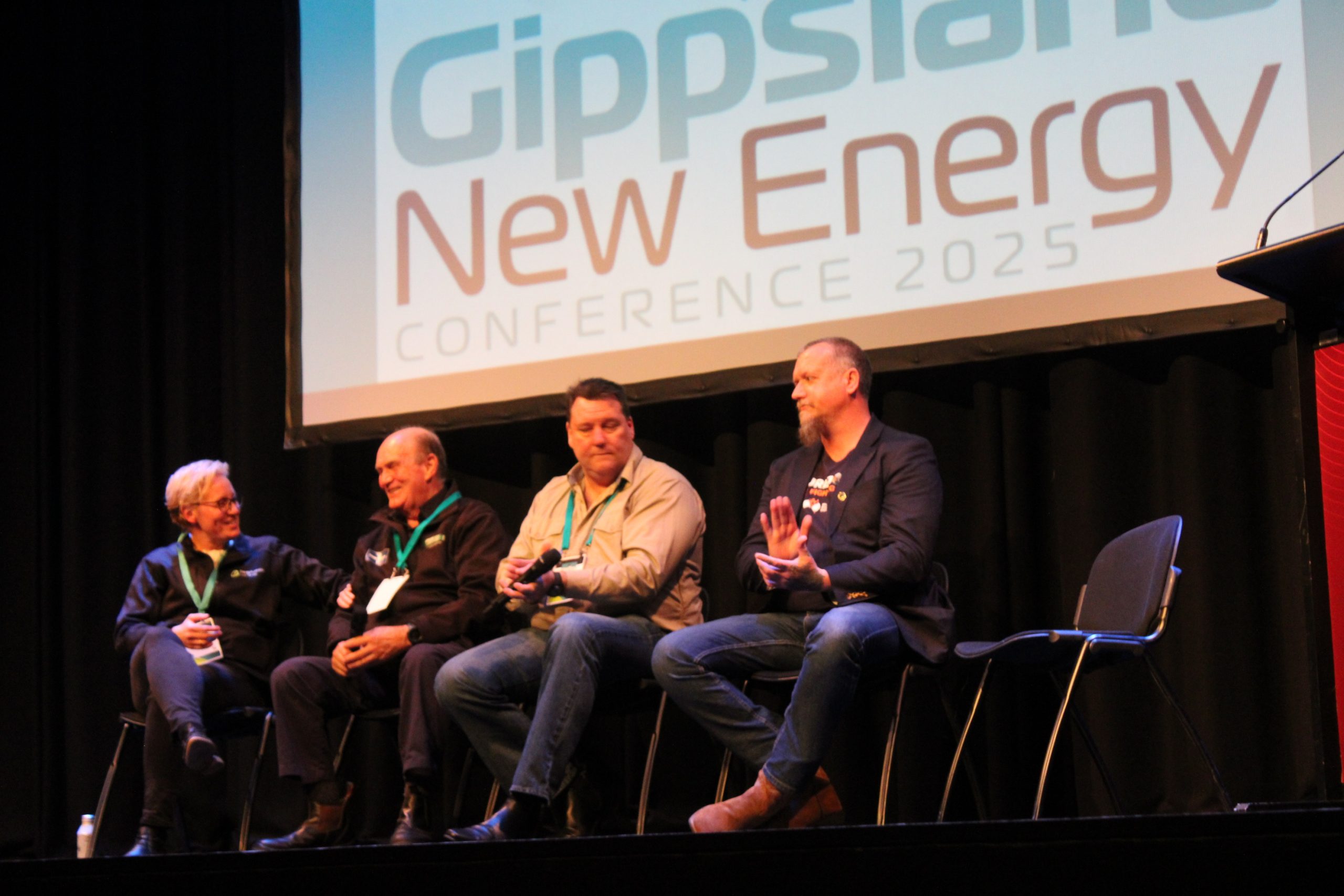By PHILIP HOPKINS
THE state government has abandoned the Latrobe Valley, its inaction resulting in no industry to replace the Yallourn power station when it closes in 2028, according to the head of the Mining Energy Union, Andy Smith.
Mr Smith, the union’s president, was speaking at the recent Gippsland New Energy Conference in Traralgon in a session that dealt with the future of jobs in the energy transition. Other speakers were Lisa Gooding, Yallourn transition leader at Energy Australia; Steve Dodd, secretary of the Gippsland Trades and Labour Council; and Adam Monument, business operations manager at Earthworker Energy, a Morwell manufacturing company.
Mr Smith said the human element often got lost in the energy discussion. The damning statistics in the area were well known – the highest rate of domestic violence in the state and the highest rate of ambulance call-outs for domestic violence; school leavers, dropping out early; and preventable disease.
“Our members and others are starting to feel what’s coming. The sense of hope that might have been there a few years back in relation to industry, offshore wind taking off to pick up some of the slack from Yallourn, that ship has sailed. It’s not going to line up, people are becoming aware of these things,” he said.
Mr Smith said the government had seven years to plans for the closure of Yallourn.
“Four years have gone already. Very little has been done in that time to bring investment and new industry into the Latrobe Valley. Because of inactivity through various government bodies and the state government in particular, we now face the Latrobe Valley not having any new industry in place for the closure of Yallourn,” he said.
“I categorically state: there will be no new industry in place by the closure of Yallourn. That’s something that’s hard to swallow, particularly for the workers. Unless something happens, we will have the same conversation in eight years’ time for Loy Yang. We must start improving the processes for approvals for new industry, for funding for new industry.
“If we sit on our hands and wait for governments to do it for us, it won’t happen. Communities need to take charge and make sure Yallourn workers are looked after 100 per cent of the way …. keep focusing on what happens. Ten years might seem a long time, but it will happen quickly.”
Ms Gooding, who had given an overview of Energy Australia’s retraining programs for its workforce, said she was also on the board of the Committee for Gippsland, which is tasked to generate business investment in Gippsland.
“There is a need for co-investment in government and business. We are trying to advocate to government for a fund so that businesses can come and locate in this region, or business here can grow,” she said.
The region had a highly skilled workforce. Most other regions have skills shortage.
“We have a social licence for heavy industry from the power sector. Yallourn owns land on either side – there is huge opportunity to place industry there and create jobs,” Ms Gooding said.
“There is opp for new generation technologies in terms of energy, heavy industry, defence manufacturing, construction, perhaps even work with geothermal potential. We will have to call on the state and federal governments to support us.”
Ms Gooding said the Latrobe Valley would do the heavy lifting for Victoria in terms of decarbonisation.
“On that basis, this region has the right to call out and ask for support to invest in businesses. Business create the long-term jobs, the new industries that are ongoing. Yes, the Latrobe Valley Authority came and went with short-term construction, basketball stadiums …we need businesses that will continue to operate year in and year out,” she said.
Out of Yallourn’s workforce of 500, people moving into new and wonderful ways through the training program, becoming midwives, primary school teachers, a zoologist who will focus on eradicating invasive species in Gippsland and in media/communications.
“A cohort at Yallourn – the older 20 per cent, will seek to retire,” she said.
“Marinus Link will start soon at Hazelwood.”
Ms Gooding said “Create a job, there is no social security payment involved”.
“It’s a saving; invest in a business and create a job and opportunity and get them off Centrelink,” she said.
Mr Dodd said there were lots of projects, “but they are all in the parking bay at the moment – coal to hydrogen fertiliser, biomass, waste to energy”.
“There needs to be some support. We have to advocate a lot harder,” he said.
The state government made money available after Hazelwood closed, which the GTLS used for retaining. More than 2000 workers overall picked up 4000 qualifications, but nationally accredited qualifications were lacking.
“More than 85 per cent went to other jobs. That will be the issue for us when the next power station shuts – where are they going to go?”
There were other training programs for migrant women, teaching them to drive, and 38 apprenticeships for young people through the Men’s Shed, he said.
Mr Monument said he had become adaptable and resilient in the ‘transition’ since he was a teenager, having experienced privatisation of the SEC and the looming closure of Hazelwood. It was a difficult time, in and out of work.
“I did go to Yallourn, but resigned at the announcement of the closure, ” he said, finding work at Australian Paper.
“In 12 months, I was back on the chopping block when the paper line was shut. A few families went to Queensland, a minimal amount went West. I elected to stay here in the Valley, where I was born; most stayed, some were lucky enough to get a job. The percentage of people I know who got full-time job early is not high.”
Mr Monument said his company, Earthworker, which makes tanks for hot water and retails complete hot water units, began about the time of Hazelwood’s closure with backing from the trade union movement.
“Small, we hoped for more growth than we have had, but it’s proof it’s possible to bring a new industry to the Valley. No one made hot water services in the Valley but we have skills and the right attitude. It is alive, but we don’t want to ask the government for funding or anything like that, but one of the challenges we face, is based on this inaction,” he said.
“The government likes photo opportunities of what we do, but the assistance we really need for us to grow – and maybe other businesses set up in the same way – it needs to be properly driven by the state government. We exist and are trying, and could be a model for the transition, but not just the backing of the trade union movement and people who believe in us, it would need endorsement and assistance from the government.”
Mr Monument added: “We are not parked, but are in holding pattern; we just require that minimum to get us to the next step. We could be something for the region, but are asking for a paltry amount to grow and create more jobs.”
Mr Monument emphasised the need for better education for young people coming through TAFE and the secondary school system.
“Put courses in place. Electrification of everything will require a massive number of electricians. Let’s start building curriculum and making courses available, not just for people leaving the industry or transitioning, but the kids coming up through the ranks,” he said.
“They are here because their parents are here. They can’t just pack up and go.”
Mr Smith concluded: “Coal is a dirty word and it has been for a long time, and it’s not going to get any cleaner.”
“The best way to recognise work done is to provide real opportunities to continue living in this area. The best way to support coal workers is to keep them going in a meaningful way,” he said.
“We have environmental groups, community, unions, business, local government, government – different bodies looking at the same thing but from different lenses. Until the groups start to come together and work for a common cause, we won’t be able to make progress in the community.”











